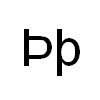
Thursday, August 24, 2006
Oh me so Þorny...
 ...well, at least in modern Icelandic, Old Norse, and Old and Middle English. Thorn, or þorn (Þ, þ), traces its roots back to Proto-Germanic, where it has been reconstructed as *Thurisaz.
...well, at least in modern Icelandic, Old Norse, and Old and Middle English. Thorn, or þorn (Þ, þ), traces its roots back to Proto-Germanic, where it has been reconstructed as *Thurisaz.So, where has Þ gone in our modern English alphabet? Alas, we've replaced this ancient letter with the rather boring digraph th. Just þink about it; we could save ourselves the effort of typing one extra letter every time we spell a word that uses either a voiceless interdental fricative (like th as in the English word thick) or a voiced dental fricative (like th as in the English word the). Þe possibilities are endless.
Sometime during þe 14þ century th started to become more common in English. As its popularity waned, poor þ began to lose its shape (more specifically, it lost its ascender), first appearing similar to the Old English letter wynn (Ƿ, ƿ), þen later morphing into a Y. You can still see ghosts of our þorny linguistic past in pseudo-archaic usages such as "Ye olde...". I þink it's important to point out þat no one during this "Ye" period would ever pronounce the word Ye as yee; in this case, the Y still retained its þ'isitiy (th).
:-Þ
Labels: Icelandic, Middle English, Old English, Old Norse, Proto-Germanic
:: posted by David, 1:59 PM